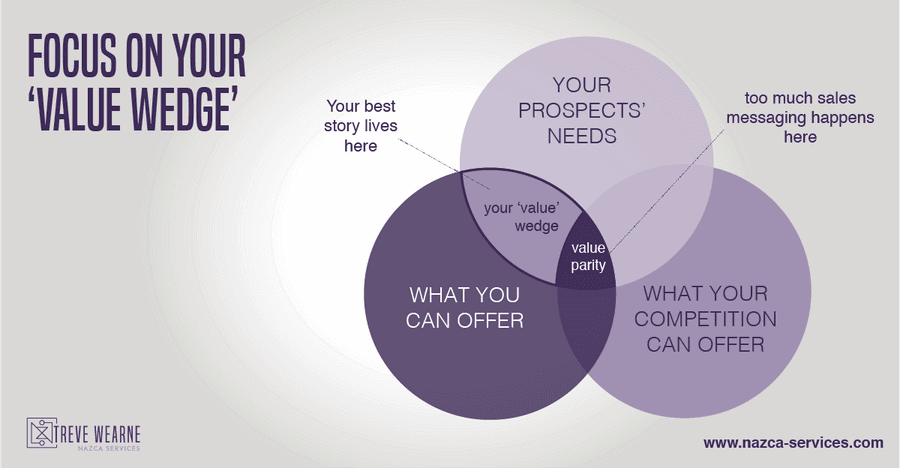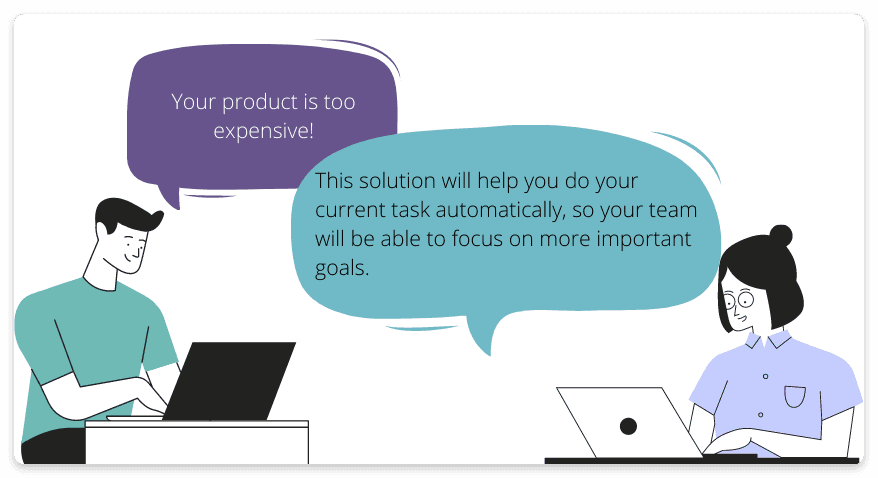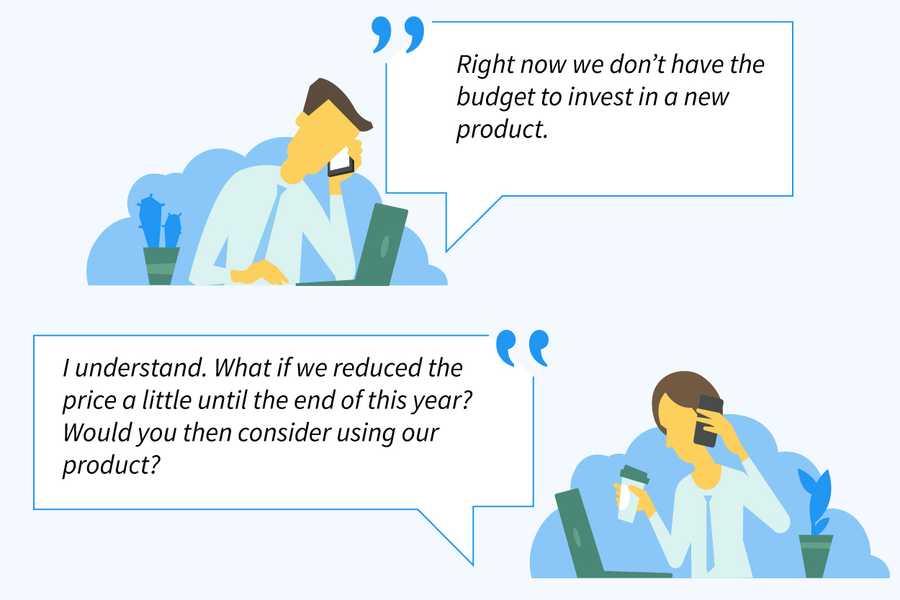4 Steps to Overcoming Sales Objections
Curated from: rainsalestraining.com
Ideas, facts & insights covering these topics:
20 ideas
·38.3K reads
213
3
Explore the World's Best Ideas
Join today and uncover 100+ curated journeys from 50+ topics. Unlock access to our mobile app with extensive features.
Defining a Sales Objection
A sales objection is an explicit expression by a buyer that a barrier exists between the current situation and what needs to be satisfied before buying from you.
In other words, it's a clear signal that you have more work to do in the selling process.
628
5.35K reads
The Most Common Sales Objections
Sales objections often signal that you haven’t made the value proposition case to the buyer as powerfully as possible.
- Need: Buyer doesn't yet perceive, or doesn't yet admit, the need to solve a problem.
- Urgency: The buyer doesn't yet see why the issue is pressing.
- Trust: Buyer feels uncertainty about you, your solution, your company, or your outcomes.
- Money: Buyer communicates that money is going to be an issue.
While these common sales objections might seem like steep hills to overcome, don’t despair: an objection indicates that the buyer is engaged, which sure beats apathy.
695
3.5K reads
Overcoming Sales Rejection: Listen To the Customer
Your first reaction when you hear an objection may be to jump right in and respond immediately. Resist this temptation.
Instead:
- Take the time to listen to the objection fully
- Don't react defensively
- Train yourself to ignore any negative emotions you may be feeling
- Stay focused on what the buyer is saying and the business problem you’re helping to solve
- Listen with the intent of fully understanding the buyer's concerns without bias or anticipation
- Allow your body language and verbal confirmations to communicate to the buyer that you're listening intently.
685
2.79K reads
Understand the Objection Completely
Many objections hide underlying issues that the buyer can't or isn't ready to articulate. Often the true issue isn't what the buyer first tells you. It's your job to get to the heart of the objection—to fully understand it and its true source.
To do this, ask permission from the buyer to understand and explore the issue. From there, restate the concern as you understand it. Sometimes when you restate the objection, the buyer sees the issue more fully, and you get closer to the true source of the objection as a result.
629
2.28K reads
Respond Properly
After you're confident you've uncovered all objections, address the most important objection first. Once you work through the greatest barrier to moving forward, other concerns may no longer matter as much to the buyer.
You should do your best to resolve their issue right away if possible. The more effectively you can resolve issues in real time, the greater chance you have of moving the sale forward. If you need more information to resolve a specific concern, you may have to look something up or investigate further.
613
1.93K reads
Confirm You've Satisfied the Objection
Once you've responded to the buyer's objections, check if you've satisfied all of their concerns. Just because they nodded during your response doesn't mean they agreed with everything you said. Ask if the buyer is happy with your solution and explain your solution further if necessary. Sometimes you need to go through a process to overcome sales objections, rather than a quick answer or a-ha moment.
If the buyer isn't ready, don't try to force a commitment. Be sure not to accept a lukewarm "yes" for an answer though, either.
622
1.68K reads
Money Objections in Sales: Choose your words wisely
As much as you might like to respond, “You get what you pay for,” or, “Those are our fees and we’re worth every penny,” don’t. There's no glib, pat answer to money objections.
604
2.01K reads
It’s Not All About The Money
Price is often a “red herring” objection. Work to uncover the real objection. (Refer to the 6 types of money objections below.) Ask questions.
Find out if money is really the issue with one simple question: “If money wasn’t an object, what then?” This will usually lead you to the root objection to the sale.
626
1.78K reads
Get Back To Value
Communicate a clear picture of the value of the solution you established in the selling process. The right buyer can usually “find” the money if the value is too strong to pass up—if the solution you’ve proposed answers their needs especially well.
Most times when buyers say, “Your price is too high,” what they’re really saying is, “I don't see the value of your solution.”
644
1.65K reads
Ask, “Which Part Don’t You Want?”
Review the component parts of the solution. This may lead to either a reduction in scope or having the buyer realize the whole package is the best solution.
You’ll end up going down a slippery slope if you start justifying your price by what your costs are.
613
1.54K reads
Don’t Drop Your Price
If you’re willing to simply drop your price, you’re telling buyers this is the way you operate. Instead, explore new possibilities, change scope, or make a trade that could change the price.
An arbitrary price reduction can sow mistrust and set the precedent for lower prices for as long as you work with that buyer. Always trade for value.
635
1.49K reads
Maintain A Peer Relationship With The Decision Maker
Don't appear to look upward for guidance at your organization, even if you might have to.
You may be dealing with the wrong buyer who isn't high enough in the organization or isn't the economic decision-maker. Money is certainly an objection for them because they can't pull the trigger even if they wanted to.
602
1.42K reads
Types of Money Objections: Whack Back
What the buyer says: “Wow, that’s a lot. Can we do it for less?”
What it means: This comes from the buyer who always asks for a price reduction because it’s worked in the past. Their philosophy is that it can’t hurt to ask.
622
1.48K reads
Types of Money Objections: Bluffing
What the buyer says: “Oh, I don’t have the money. We’ll need to do it for less.”
What it means: The buyer has the money, but doesn’t want you to know that. It’s a ploy to see how low you’ll go.
622
1.49K reads
Types of Money Objections: Value Challenge
What the buyer says: “It costs too much. Money is going to be a problem.”
What it means: The buyer doesn’t see the value your solution delivers. Perhaps they can’t justify spending more than they did previously.
615
1.47K reads
Types of Money Objections: Budget Pushback
What the buyer says: “It’s not in the budget.”
What it means:
(a) It’s true, and they’d like to see what can be worked out.
(b) It’s true, and they’re using that as a bargaining chip.
(c) It’s not true, and they’re just saying it.
611
1.36K reads
Types of Money Objections: Competitor Pressure
What the buyer says: “We received other proposals and your price is the highest.”
What it means:
(a) It’s true, and they’re using that as a bargaining chip.
(b) It’s not true, or at least not the whole truth.
612
1.36K reads
Types of Money Objections: We’re Done
What the buyers says: “Too much money. Call me back if you can go lower.”
What it means:
(a) It’s a bluff, they assume you’ll come back with a lower price.
(b) It’s not a bluff, they hope you’ll lower price to do business.
607
1.29K reads
Keeping Your Eyes on the Prize
When faced with sales objections, don't lose sight of your end goal: overcome the sales objection and make advances towards gaining commitment from the buyer.
In a transactional sale, sellers are taught to overcome objections at all costs. This doesn't work for more complex sales. If you just plough through the objection without addressing it fully, the underlying reason for the objection will usually come back to haunt you.
Remember, you have to work with these people once you're done selling to them!
605
1.17K reads
Objections Are Valuable
Objections have merit: they're often a sign that something else is going on. Your purpose is to understand the objection fully, isolate it, and respond to it appropriately—not necessarily rebut, counter, and argue. You may need to build a case for overcoming an objection instead of answering quickly on the fly.
615
1.25K reads
IDEAS CURATED BY
CURATOR'S NOTE
Turning a No Into a Yes
“
Jacqueline Moyer's ideas are part of this journey:
Learn more about marketingandsales with this collection
Effective communication
Persuasion techniques
Closing a sale
Related collections
Similar ideas
Read & Learn
20x Faster
without
deepstash
with
deepstash
with
deepstash
Personalized microlearning
—
100+ Learning Journeys
—
Access to 200,000+ ideas
—
Access to the mobile app
—
Unlimited idea saving
—
—
Unlimited history
—
—
Unlimited listening to ideas
—
—
Downloading & offline access
—
—
Supercharge your mind with one idea per day
Enter your email and spend 1 minute every day to learn something new.
I agree to receive email updates





